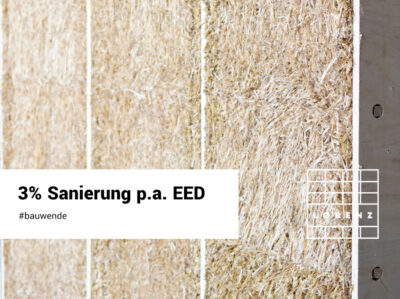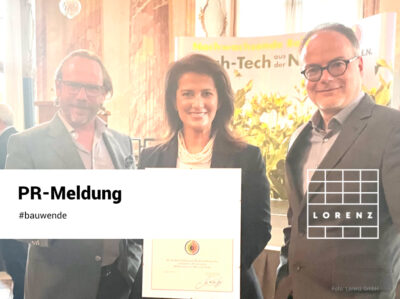Stop of the KfW new construction funding: Negative effect on LORENZ projects does not materialize!

The federal government’s abrupt stop to KfW new building funding at the end of January has no effect on LORENZ projects. In the future, new buildings should be assessed according to their CO2 footprint.
On January 24, 2022, the Federal Ministry for Economic Affairs and Climate Protection (BMWK) suspended parts of the federal funding for efficient buildings (BEG) with immediate effect. With the temporary program stop for BEG funding and the conversion of the EH55 standard to the legal minimum standard, KfW and the new federal government are reacting to mismanagement of climate policy in recent years, according to the ministry.
The decisive factor for this step was the increasing number of applications that affected the new construction funding for the Efficiency House/Efficiency Building 55 (EH55), which expired at the end of the month. According to a press release from the Federal Ministry, an urgent revision of the entire new construction funding system has become necessary. In addition to the early end of the KfW55 program, the previous rules for KfW 40 subsidies are also up for grabs.
For applications received by January 24, 2022, the federal government is now apparently spending 5.4 billion euros from the energy and climate fund in order to approve eligible applications after all, i.e. to process them according to the “old” criteria. A rapid new regulation of federal funding for energy-efficient buildings is now being promised.
LORENZ projects not affected
Lorenz GmbH states that current projects under construction using LORENZ products are not affected by the stoppage of the new construction funding programs. “Customers who are planning a straw-insulated building are consistently thinking ecologically. You are choosing a construction method that is outstanding in terms of ecological balance, beyond the subsidy options for less sustainable buildings!” says Rainer Schmidt, Managing Director of Lorenz GmbH. “We are pleased that our customers and business partners share a common vision: that an investment in buildings must be climate-positive and therefore suitable for grandchildren.” Schmidt also points out an overarching factor in Lorenz GmbH’s European foreign business: “What is particularly interesting is that “To keep an eye on the requirements of the EU taxonomy as a regulator.”
Regarding the planned revision of the BEG building funding, Schmidt explains: “LORENZ welcomes the Federal Government’s view that new standards need to be developed, as renewable building materials achieve impressive figures in terms of ecological balance at already competitive costs. We therefore call for targeted and concrete evaluation criteria, such as CO2 emissions in the production of building materials, to be included in new funding guidelines.”



